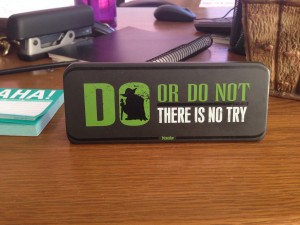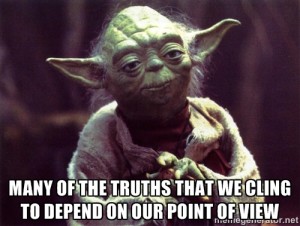 This is my the desk in my office. It’s one of the first things students, colleagues, and visitors see when they walk in and especially if they sit down to meet with me. I never see it when I sit at my desk because it is turned outward. I was kinda out-of-sorts yesterday because my assistant (who keeps me sane) was out sick 🙁 (which is normally fine) but I hadn’t taught all week because of the MLK holiday and the “snow” day 2 hour delay, which meant my class didn’t meet on Wednesday. (By the way, my mid-western friends living here were not at all impressed with our
This is my the desk in my office. It’s one of the first things students, colleagues, and visitors see when they walk in and especially if they sit down to meet with me. I never see it when I sit at my desk because it is turned outward. I was kinda out-of-sorts yesterday because my assistant (who keeps me sane) was out sick 🙁 (which is normally fine) but I hadn’t taught all week because of the MLK holiday and the “snow” day 2 hour delay, which meant my class didn’t meet on Wednesday. (By the way, my mid-western friends living here were not at all impressed with our snow dusting, but that’s for another post). Yesterday, I met with a potential PhD student who has applied to our program. She was in town scoping things out and wanted to meet with me for more information.
Anyhoo, back to me being out of sorts. This potential student was very enthusiastic and engaged, which, of course, made me very happy. The student asked a series of questions; I gave my spiel. It was a lovely conversation. And as the student was getting ready to leave, the student said, “You know, that (pointing to my yoda plaque) tells me what kind of professor you are.” I said, “How so?” The student said, “It tells me you’re gonna help students be successful, you have high expectations, but you probably don’t like excuses.” I was almost speechless (which you know doesn’t happen often). I paused and said, “Yes, in graduate school, you have two choices; to act or not act. Trying isn’t always enough. Sometimes you do, and sometimes you don’t.” The student laughed at all the Yodas in my office and left. And of course, after she left, I thought more about that quote and what it might communicate to the potential and current graduate students.
It’s interesting because this quote used by any other character or in any other context would alert  my binary alarm. Do or Do Not. Where’s the middle ground or complexity in this binary? I always try to problematize binaries because concepts that seem opposing are actually usually on a continuum of sorts. Plus, we actually have language to be much more complex than binaries often allow us to be.
my binary alarm. Do or Do Not. Where’s the middle ground or complexity in this binary? I always try to problematize binaries because concepts that seem opposing are actually usually on a continuum of sorts. Plus, we actually have language to be much more complex than binaries often allow us to be.
Yet Yoda gets a pass, well, because it’s Yoda (duh!) but also because of the context in which he uses this phrase. For Yoda, the phrase refers to commitment, perseverance, and action. I think the phrase is at the heart of being successful in graduate school or really any goal. “Trying” is often a way of convincing ourselves we’re doing, but when we’re not actually fully committing to the action or behavior.
For years, I tried to be more healthy and fit, and I tried to exercise regularly. But it wasn’t until I dedicated myself to doing it–getting fit and healthy and exercising–that I was doing it and not just trying. Now some will say this is semantics. You may have to try in order to do. But I would maintain that certain behaviors and decisions can’t just be tried, because they need the level of dedication and commitment necessary to continue doing consistently. A graduate degree is just one of these things. Cultivating a healthy lifestyle. Writing. Running. Loving. Words mean things, and we use them to construct our realities and persuade ourselves to do the things that are important. Part of my own success has been in changing the way I think about things in addition to doing. Yoda has helped me with this.

love!
I’m realizing that I can take the lessons learned from areas in which I just DO, and apply them to areas where I keep telling myself I’ll “try.” If I tell myself I’ll try, it’s usually because I assume I’ll fail. But I never tell myself that at work, I didn’t tell myself that in school, and I don’t tell myself that with my kids. There isn’t room to fail, so I just do. There is much to learn from our own experience of doing. Thanks for sharing this!
Yes, Susan, this is exactly what I was trying to articulate. Good point that we “try” when we’re unsure if we’ll succeed, but I think we can learn from the other areas of our life. What I have found is how all areas of my life began coming together when I started “doing” in all areas. Thanks for sharing! Glad you’re reading.